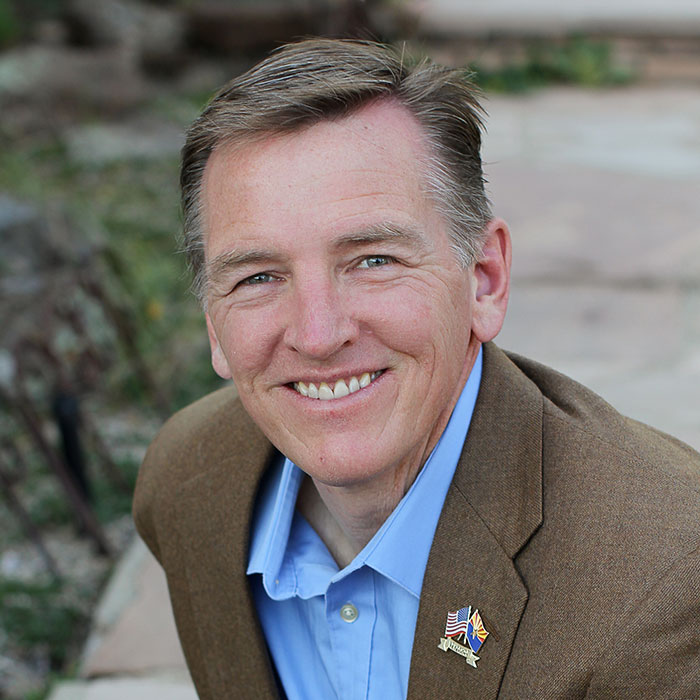Weekly Columns and Op-Eds
Payson Roundup Op-Ed: Arizona’s Outdoors Provides Many Benefits
Washington, DC,
May 28, 2013
Skim the Arizona Game and Fish Department’s weekly fishing report and you can see — spring is here and fishing is back. This is great news for anglers. But it is also good news for our economy, and underscores the importance of common-sense policies and public-private partnerships that sustain public lands and provide opportunities for sportsmen and all of us to access and enjoy the outdoors.
Arizona’s Outdoors Provides Many Benefits Skim the Arizona Game and Fish Department’s weekly fishing report and you can see — spring is here and fishing is back. This is great news for anglers. But it is also good news for our economy, and underscores the importance of common-sense policies and public-private partnerships that sustain public lands and provide opportunities for sportsmen and all of us to access and enjoy the outdoors.
Without question, Arizona is home to some the most astounding natural treasures in the world — landscapes that take your breath away. Nearly everyone has their own special place to walk, hike, hunt, fish or float down a river. Protecting our ability to access these public lands and waterways in Arizona does more than protect our quality of life. It grows our economy.
According to the Congressional Sportsmen’s Foundation, 786,000 hunters and anglers (locals and tourists) spent $1.2 billion in 2011 in Arizona. That spending employed 18,220 Arizonans — more people than are employed by Wells Fargo & Co., the third-largest employer in our state (18,220 vs. 13,859) — and generated $132 million in state and local taxes. The economic impact of other kinds of outdoor recreation, such as hiking and boating, exceeds $10 billion in Arizona.
To keep this economic engine humming, we need to pursue common-sense policies and public-private partnerships that sustain the outdoors. We need federal and state policies that balance the protection of natural wonders and open space with the need to provide sustainable cities and a high standard of living.
One of these is the little known Land and Water Conservation Fund (LWCF). For 50 years, using no taxpayer dollars, LWCF has provided $208 million to protect Lake Mead National Recreation Area, Coconino National Forest, and other areas popular with sportsmen and tourists. But the program also provides matching grants, and has enabled communities across the state to create trails, parks, skate parks and other recreational facilities, like the Payson municipal pool. Funding for LWCF comes from fees paid by companies drilling for oil and gas offshore. While pursuing America’s energy independence, we are also creating tourism jobs and close-to-home recreational opportunities.
According to the recent bipartisan Colorado College “Conservation in the Rockies” poll, 82 percent of Arizona voters recognize that public lands in the state support our economy, provide recreation opportunities, and enhance quality of life. We have public lands that require stewardship in order to maximize public utility. My bill, the Catastrophic Wildfire Prevention Act of 2013 (H.R.1345), is aimed at preventing destructive wildfires and stimulating rural economies. Specifically, the legislation renews and reforms the Forest Service’s ability to partner with private industry and local governments to implement thinning and ecological restoration projects, such as the White Mountain Stewardship Project and the Four Forest Restoration Initiative (4FRI). It also allows the federal government to partner with state foresters to treat national forest land, and streamlines the bureaucratic review process for timber and grazing projects.
Republican President Calvin Coolidge, who set aside Arizona’s Chiricahua and Wupatki National Monuments, supported conservation of the outdoors for our health. He said in 1924: “Too much emphasis cannot be placed on the effort to get the children out of the alleys and off the streets into spacious open places where there is good sunlight and plenty of fresh air. Such an opportunity has both a physical and mental effect. It restores the natural balance of life and nourishes the moral fiber of youth.”
Just last month, the Arizona Game and Fish Department held its annual Youth Day in north Phoenix. Families and 3,500 schoolchildren, teachers and chaperones enjoyed storytelling, gun safety presentations, and wildlife demonstrations. Enrique Mendez, general manager of the Cabela’s store in Glendale, which sponsored the event, said, “We were glad to have the opportunity to introduce outdoor activities to families here in the Valley.”
These kinds of public-private community programs are key to exposing residents to the public resources and outdoor wonders in their own back yards. We have great parks in Arizona that we should all try to use.
It is important that we take steps as a state and a nation to provide opportunities for Americans — especially our youth — to get outside to hunt, fish and recreate as they choose, while we’re also responsibly developing our energy and timber resources. When conservation is on equal ground with development of our public lands, we’re investing in our local economies, and the next generation.
U.S. Congressman Gosar is a Republican from Arizona’s Fourth Congressional District and a member of the House Natural Resources Committee. His district includes all of Northern Gila County.
To view this story in the Payson Roundup click HERE. |
